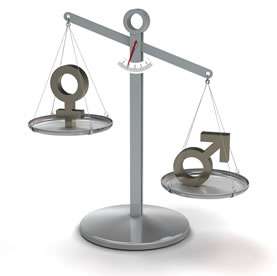A Northumbria University academic has contributed to a report showing how austerity measures are impacting upon levels of gender inequality in the North East of England, published this month.
The report, entitled 'The impact of austerity measures upon women: a case study of the North East of England', shows that rising levels of female unemployment in the UK are hitting women in the North East much harder and how public sector redundancies, together with elements of welfare reform, are increasing women's financial dependence on men. It warns that these issues are likely to have a detrimental impact upon children and lead to increases in family breakdown.
The findings of the report were presented to MPs, including Jo Swinson MP, Minister for Women and Equalities, as part of a wider study, Women's equality in the UK: A health check launched at Portcullis House in May. This week the full report was launched before North East MPs and policy makers at the Raddison Hotel in Durham.
Dr. Ruth Lewis, Senior Lecturer in Sociology at Northumbria, edited the report. She said: "The impacts of the national austerity measures, together with long-term, ingrained inequality in the region mean that the prospects for women in the North East are likely to be bleak and urgently need addressing."
Sue Robson, co-author of the report and co-ordinator of NEWomen's Network, an organisation that works to sustain women's organisations and services and champion women's rights, added: "There is a looming crisis in gender inequality in the North East which will inevitably have devastating economic and social consequences; not just for women but for children, families and communities."
The report is based upon evidence from a series of participatory local events involving 304 women and 154 different organisations. Many women's organisations in the North East also provided data, information, case studies and research to evidence the impact of the austerity measures. Statistical sources of data in the TUC Women and the Cuts Toolkit were also researched.
The report shows that the need for women-only space is even greater during challenging times yet not enough is being done by public bodies to protect women-only services from the impact of austerity measures.
Penny Remfry, a participant in the research and a trustee of a charity that provides support for women who have been raped or sexually abused, said: "Women's organisations could prevent problems from happening or from escalating, thus saving the Government money and relieving the burden on public services. Yet these organisations are dealing with increased demand and diminishing resources and many in the North East are facing closure."
Cris McCurley, senior family law practitioner and partner of Ben Hoare Bell LLP in the North East of England and member of NEWomen's Network, said: "Cuts to Legal Aid mean that access to justice is severely restricted for this, and future generations who will be denied their human rights, and the ability to legally challenge those, including the Government which is unlawfully removing those rights."
Umme Imam, a member of NEWomen's Network and Executive Director of the Angelou Centre, an organisation that promotes equality, inclusion and economic independence for Black and Minority Ethnic women and children in the North East, said: "We are calling on the UK Government to take measures to redress the negative impact of the austerity measures upon women's economic independence in the North East, such as increasing access to childcare (for under two-year-olds), education and training through investing in the women's organisations."
The report also recommends that public bodies in the North East should value and encourage women's active citizenship, as well as ensuring women receive the services they need.
Provided by Northumbria University



















